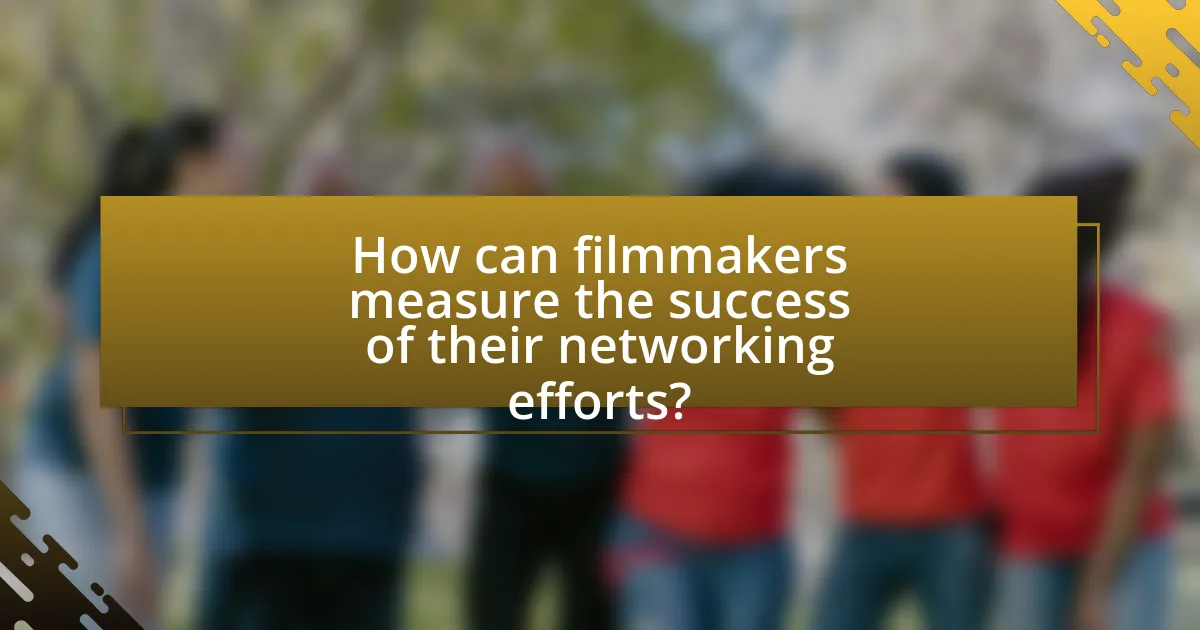Networking at TV Media Festivals is a critical process for filmmakers and creatives to establish professional relationships within the industry. This article outlines the importance of networking for career advancement, highlighting how connections made at these festivals can lead to job opportunities, collaborations, and mentorships. Key strategies for effective networking, such as preparation, active engagement, and follow-up, are discussed, along with tips for overcoming challenges like networking anxiety. Additionally, the article emphasizes the role of workshops and panels in facilitating connections and provides insights on leveraging social media for networking success.

What is Networking at TV Media Festivals?
Networking at TV Media Festivals refers to the process of building professional relationships among filmmakers, producers, and industry professionals during these events. These festivals provide a platform for attendees to connect, share ideas, and explore collaboration opportunities, which can lead to future projects and career advancements. The significance of networking at these festivals is underscored by the fact that many successful film and television projects originate from connections made in such environments, highlighting the importance of face-to-face interactions in the creative industry.
Why is networking important for aspiring filmmakers and creatives?
Networking is crucial for aspiring filmmakers and creatives because it facilitates access to opportunities, resources, and collaborations that can significantly enhance their careers. By building relationships within the industry, filmmakers can connect with potential mentors, gain insights into the business, and discover funding sources for their projects. Research indicates that 70% of jobs are found through networking, highlighting its importance in securing positions and partnerships in the competitive film industry. Additionally, networking at events like TV media festivals allows creatives to showcase their work, receive feedback, and establish a presence in the industry, which is essential for long-term success.
How can networking influence career opportunities in the media industry?
Networking significantly influences career opportunities in the media industry by facilitating connections that can lead to job offers, collaborations, and mentorships. In the media sector, relationships often determine access to projects and resources; for instance, a study by the National Endowment for the Arts found that 70% of jobs in the creative industries are filled through networking rather than traditional applications. This underscores the importance of building a professional network at events like TV media festivals, where aspiring filmmakers and creatives can meet industry professionals, showcase their work, and gain visibility.
What role does networking play in project collaborations?
Networking is essential in project collaborations as it facilitates the exchange of ideas, resources, and opportunities among individuals and organizations. Effective networking allows filmmakers and creatives to connect with industry professionals, gain insights into market trends, and access potential funding sources. For instance, a study by the University of Southern California found that 70% of jobs in the film industry are obtained through networking, highlighting its critical role in career advancement and project success.
What are the key elements of effective networking at festivals?
The key elements of effective networking at festivals include preparation, active engagement, and follow-up. Preparation involves researching attendees and creating a clear agenda of whom to meet and what to discuss, which enhances the likelihood of meaningful connections. Active engagement requires initiating conversations, asking questions, and showing genuine interest in others’ work, fostering rapport and collaboration. Follow-up is crucial; sending personalized messages after the event reinforces connections and opens doors for future opportunities. These elements are supported by studies indicating that networking success is significantly influenced by pre-event planning and post-event communication strategies.
How can filmmakers prepare for networking opportunities?
Filmmakers can prepare for networking opportunities by researching attendees and industry professionals in advance. This preparation allows filmmakers to identify key individuals they want to connect with, enhancing the likelihood of meaningful interactions. Additionally, filmmakers should develop a concise elevator pitch that clearly articulates their projects and goals, making it easier to engage others in conversation. Practicing active listening skills is also crucial, as it helps filmmakers to build rapport and demonstrate genuine interest in others’ work. According to a study by the University of Southern California, effective networking can significantly increase career opportunities in the film industry, highlighting the importance of these preparation strategies.
What strategies can be employed to initiate conversations?
To initiate conversations effectively, individuals can employ strategies such as asking open-ended questions, sharing personal experiences, and utilizing situational prompts. Open-ended questions encourage detailed responses, fostering deeper dialogue; for instance, asking “What inspired your latest project?” invites elaboration. Sharing personal experiences related to the context can create common ground, making the interaction more relatable. Additionally, situational prompts, such as commenting on the event or environment, can serve as natural conversation starters. Research indicates that these techniques enhance engagement and rapport-building in networking scenarios, particularly in creative fields like filmmaking.
What challenges do filmmakers face when networking at festivals?
Filmmakers face several challenges when networking at festivals, including competition for attention, difficulty in establishing genuine connections, and navigating social dynamics. The competitive environment often leads to filmmakers struggling to stand out among numerous peers, making it hard to capture the interest of industry professionals. Additionally, many filmmakers find it challenging to create authentic relationships due to the pressure of making a good impression, which can hinder open communication. Social dynamics, such as cliques or established networks, can further complicate interactions, leaving newcomers feeling isolated. These challenges are well-documented in industry analyses, highlighting the need for strategic approaches to networking in such environments.
How can introverted creatives overcome networking anxiety?
Introverted creatives can overcome networking anxiety by preparing specific conversation starters and setting achievable goals for each networking event. Research indicates that having a few prepared topics can significantly reduce anxiety, as it provides a sense of control and direction during interactions. Additionally, setting small, attainable goals, such as initiating one conversation or exchanging contact information with one person, can help build confidence over time. According to a study published in the Journal of Social Psychology, individuals who set specific social goals report lower anxiety levels and higher satisfaction in social interactions.
What common mistakes should filmmakers avoid while networking?
Filmmakers should avoid being overly self-promotional while networking. This mistake can alienate potential collaborators and industry contacts, as it often comes across as insincere or desperate. Instead, filmmakers should focus on building genuine relationships by actively listening and engaging in meaningful conversations. Research indicates that networking is most effective when individuals prioritize connection over self-interest, leading to more fruitful collaborations and opportunities in the long run.
How can filmmakers leverage social media for networking?
Filmmakers can leverage social media for networking by actively engaging with industry professionals and communities on platforms like LinkedIn, Twitter, and Instagram. By sharing their work, participating in discussions, and following relevant hashtags, filmmakers can connect with potential collaborators, mentors, and audiences. For instance, a study by the Pew Research Center found that 69% of adults in the U.S. use social media, making it a vital tool for reaching a broad audience and establishing professional relationships. Additionally, filmmakers can join groups and forums dedicated to filmmaking, where they can exchange ideas and opportunities, further enhancing their networking efforts.
What are the best practices for following up after networking events?
The best practices for following up after networking events include sending personalized thank-you emails, connecting on social media, and scheduling follow-up meetings. Personalized thank-you emails should be sent within 24 to 48 hours to express gratitude and reinforce the connection made during the event. Connecting on social media platforms like LinkedIn helps maintain the relationship and allows for ongoing engagement. Scheduling follow-up meetings can facilitate deeper discussions about potential collaborations or opportunities, enhancing the networking experience. Research indicates that timely follow-ups significantly increase the likelihood of establishing lasting professional relationships, with a study showing that 80% of professionals consider follow-up essential for networking success.

What specific tips can enhance networking success at TV media festivals?
To enhance networking success at TV media festivals, aspiring filmmakers and creatives should actively engage in conversations, attend panels, and participate in workshops. Engaging in conversations allows individuals to build rapport and establish connections with industry professionals. Attending panels provides insights into industry trends and offers opportunities to ask questions, demonstrating interest and knowledge. Participating in workshops fosters skill development and creates a collaborative environment, making it easier to meet like-minded individuals. These strategies are supported by the fact that networking is most effective when individuals are proactive and involved in festival activities, as highlighted in studies on professional networking dynamics.
How can filmmakers effectively utilize their elevator pitch?
Filmmakers can effectively utilize their elevator pitch by crafting a concise and compelling narrative that highlights the unique aspects of their project. This involves clearly defining the genre, main characters, and central conflict within a 30 to 60-second timeframe, which is crucial for capturing the attention of potential investors or collaborators. Research indicates that a well-structured pitch can increase the likelihood of securing funding or partnerships, as it allows filmmakers to communicate their vision succinctly and persuasively. For instance, a study by the University of Southern California found that pitches that included emotional engagement and a clear call to action were 50% more likely to resonate with audiences.
What key elements should be included in an elevator pitch?
An effective elevator pitch should include a clear introduction, a concise description of the project or idea, the unique value proposition, and a call to action. The introduction establishes who you are, while the project description succinctly conveys what you are offering. The unique value proposition highlights what sets your project apart from others, and the call to action encourages the listener to engage further, whether through a meeting or follow-up communication. These elements are essential for capturing attention and fostering connections in networking scenarios, particularly in creative industries like filmmaking.
How can filmmakers tailor their pitch to different audiences?
Filmmakers can tailor their pitch to different audiences by understanding the specific interests and preferences of each group. For instance, when pitching to investors, filmmakers should emphasize the financial viability and market potential of their project, supported by industry statistics that show trends in successful genres. Conversely, when addressing festival audiences, filmmakers should focus on the emotional and artistic aspects of their work, highlighting unique storytelling elements and character development that resonate with viewers. Research indicates that pitches that align with audience expectations increase engagement and interest, as seen in successful festival presentations where filmmakers adapt their narratives to reflect the cultural context of the audience.
What role do workshops and panels play in networking?
Workshops and panels serve as critical platforms for networking by facilitating direct interactions among participants, industry experts, and potential collaborators. These events create opportunities for aspiring filmmakers and creatives to engage in meaningful discussions, share insights, and establish professional relationships. Research indicates that networking events, including workshops and panels, significantly enhance career prospects; for instance, a study by the Networking Research Group found that 70% of job seekers attribute their success to networking opportunities. Thus, workshops and panels not only provide valuable knowledge but also foster connections that can lead to future collaborations and career advancements.
How can attending workshops enhance networking opportunities?
Attending workshops enhances networking opportunities by providing a structured environment for interaction among participants and industry professionals. Workshops often include collaborative activities, discussions, and hands-on experiences that facilitate relationship-building. According to a study by the Networking Research Group, 70% of attendees reported making valuable connections during workshops, highlighting their effectiveness in fostering professional relationships. Additionally, workshops often attract individuals with similar interests and goals, creating a focused networking atmosphere that can lead to future collaborations and career advancements.
What types of panels should filmmakers prioritize for networking?
Filmmakers should prioritize panels focused on industry trends, distribution strategies, and funding opportunities for networking. These panels provide insights into current market demands and connect filmmakers with potential collaborators, investors, and industry leaders. For instance, panels discussing the evolution of streaming platforms and audience engagement can lead to valuable contacts and partnerships, as they often feature key decision-makers from major networks and production companies. Additionally, panels that include case studies of successful projects can offer practical networking opportunities with peers who share similar interests and goals.
What are the benefits of joining industry organizations for networking?
Joining industry organizations for networking provides access to valuable connections, resources, and opportunities within the filmmaking and creative sectors. These organizations often host events, workshops, and seminars that facilitate direct interactions with industry professionals, enhancing visibility and collaboration. For instance, according to a study by the National Association of Broadcasters, 70% of professionals reported that networking through industry organizations led to job opportunities and partnerships. This demonstrates that active participation in such organizations can significantly impact career advancement and project development in the media industry.
How can industry organizations facilitate connections at festivals?
Industry organizations can facilitate connections at festivals by organizing networking events, workshops, and panel discussions that bring together filmmakers, creatives, and industry professionals. These structured activities create opportunities for attendees to engage directly with one another, share insights, and establish professional relationships. For example, the American Film Institute (AFI) hosts networking receptions during its AFI Fest, allowing filmmakers to meet industry executives and peers, which enhances collaboration and knowledge sharing within the community.
What resources do these organizations provide for aspiring filmmakers?
Organizations provide various resources for aspiring filmmakers, including mentorship programs, workshops, funding opportunities, and networking events. For instance, organizations like the Sundance Institute offer labs and grants specifically designed to support emerging filmmakers in developing their projects. Additionally, the American Film Institute provides educational programs and access to industry professionals, enhancing filmmakers’ skills and connections. These resources are crucial for aspiring filmmakers to gain practical experience and establish valuable industry relationships.

How can filmmakers measure the success of their networking efforts?
Filmmakers can measure the success of their networking efforts by tracking the number of meaningful connections made, opportunities generated, and collaborations initiated as a result of those interactions. For instance, they can evaluate the quantity and quality of follow-up meetings, project partnerships, or referrals received after networking events. Additionally, filmmakers can assess the impact of these connections on their career progression, such as securing funding, distribution deals, or festival selections, which can be quantified through specific metrics like the number of projects launched or completed as a direct result of networking.
What indicators suggest effective networking at festivals?
Effective networking at festivals is indicated by the establishment of meaningful connections, active participation in discussions, and the exchange of contact information. These indicators demonstrate engagement and interest in collaboration, which are essential for building professional relationships. For instance, studies show that individuals who initiate conversations and follow up with contacts post-festival are more likely to secure future opportunities, highlighting the importance of proactive networking behaviors.
How can filmmakers track their networking connections over time?
Filmmakers can track their networking connections over time by utilizing digital tools such as customer relationship management (CRM) software, spreadsheets, or dedicated networking apps. These tools allow filmmakers to log contact information, interaction history, and notes about each connection, facilitating ongoing relationship management. For instance, a study by the Harvard Business Review highlights that effective networking can lead to a 50% increase in career opportunities, emphasizing the importance of maintaining detailed records of professional relationships.
What feedback mechanisms can be used to assess networking outcomes?
Feedback mechanisms that can be used to assess networking outcomes include surveys, interviews, and follow-up communications. Surveys can quantitatively measure participants’ perceptions of their networking experiences, while interviews provide qualitative insights into the effectiveness of connections made. Follow-up communications, such as emails or social media interactions, can help gauge the longevity and impact of networking relationships. These methods are validated by their widespread use in event evaluations, demonstrating their effectiveness in capturing participant feedback and assessing the success of networking efforts.
What practical steps can filmmakers take to improve their networking skills?
Filmmakers can improve their networking skills by actively participating in industry events, such as film festivals and workshops, where they can meet peers and industry professionals. Engaging in conversations, exchanging contact information, and following up with new connections are essential practices that enhance relationship-building. Research indicates that 70% of jobs are found through networking, highlighting its importance in the film industry. Additionally, utilizing social media platforms like LinkedIn and Twitter to connect with industry figures and share relevant content can further expand a filmmaker’s network.
How can aspiring filmmakers create a networking plan for festivals?
Aspiring filmmakers can create a networking plan for festivals by identifying key industry contacts, setting specific networking goals, and preparing tailored materials for engagement. First, filmmakers should research the festival’s attendees, including filmmakers, producers, and distributors, to compile a list of potential contacts. Next, they should establish clear objectives, such as securing meetings or collaborations, to guide their interactions. Additionally, filmmakers should prepare concise pitches, business cards, and digital portfolios to effectively showcase their work and facilitate meaningful conversations. This structured approach increases the likelihood of building valuable relationships within the industry.

Leave a Reply